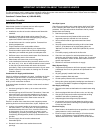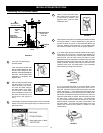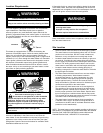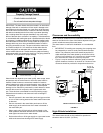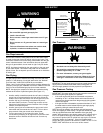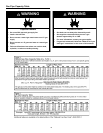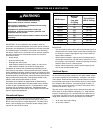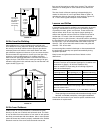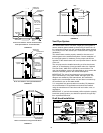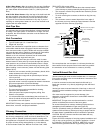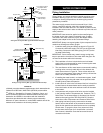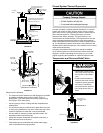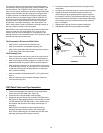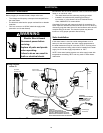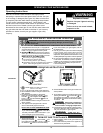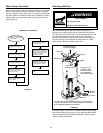
19
FIGURE 18.
Vent Pipe System
This water heater uses a non-direct, single-pipe vent system to
remove exhaust gases created by the burning of fossil fuels. Air
for combustion is taken from the immediate water heater location
or is ducted in from the outside (see “Combustion Air Supply and
Ventilation”).
This water heater must be properly vented for the removal of
exhaust gases to the outside atmosphere. Correct installation of
the vent pipe system is mandatory for the proper and efficient
operation of this water heater and is an important factor in the life
of the unit.
The vent pipe must be installed according to all local and state
codes or, in the absence of local and state codes, the “National
Fuel Gas Code”, ANSI Z223.1(NFPA 54)-current edition. The
vent pipe installation must not be obstructed so as to prevent the
removal of exhaust gases to the outside atmosphere.
IMPORTANT: The use of vent dampers is not recommended
by the manufacturer of this water heater. Although some vent
dampers are certified by CSA International, this certification
applies to the vent damper device only and does not mean they
are certified for use on this water heater.
U.L. recognized fuel gas and carbon monoxide (CO) detectors
are recommended in all applications and should be installed
using the manufacturer’s instructions and local codes, rules, or
regulations.
IMPORTANT: If you lack the necessary skills required to properly
install this venting system, you should not proceed, but get help
from a qualified technician.
Draft Hood Installation
Installation above
elevation 5,400 ft.
(1,646 m) from sea
level, Reducer Flue
must be installed on
40 gallon unit.
Flat Side Of Hood
Next To Water
Connections.
Draft Hood
Legs
Legs
Slot
Slot
Top
Install The Draft Hood With The Four Screws Provided.
Screw
Install The Draft Hood With The Four Screws Provided.
50 GAL. UNIT
40 GAL. UNIT
Draft Hood
Legs
Screw
Legs
Slot
Top
Slot
Reducer Flue
Flat Side Of Hood
Next To Water
Connections.
FIGURE 19.
FIGURE 15.
FIGURE 16.
FIGURE 17.
All Air From Outdoors: Inlet Air From Ventilated
Crawl Space/Outlet Air To Ventilated Attic
Confined
Space
Outlet Air
to the Attic
1 sq. in. per
4000 BTUH
Inlet Air
from the
Crawl Space
Alternative
Air Inlet
1 sq. in. per
4000 BTUH
Open
Foundation
Vent
s
Gable Vent
to Outdoor
Install Above
Insulation
Gable Vent
to Outdoors
Install Above
Insulation
Confined
Space
All Air from Outdoors Through Ventilated Attic
Outlet Air
to the Attic
1 sq. in. per
4000 BTUH
Inlet Air Duct
1 sq. in. per
4000 BTUH
12” Max.
All Air From Outdoors Using Horizontal Ducts
Confined
Space
Outlet
Outdoor
Air Ducts
Inlet
1 sq. in. per
2000 BTUH
1 sq. in. per
2000 BTUH
All Air From Outdoors - Using A Single Permanent Opening
Confined
Space
1 sq. in. per
3000 BTUH
Alternative
Opening
Location



